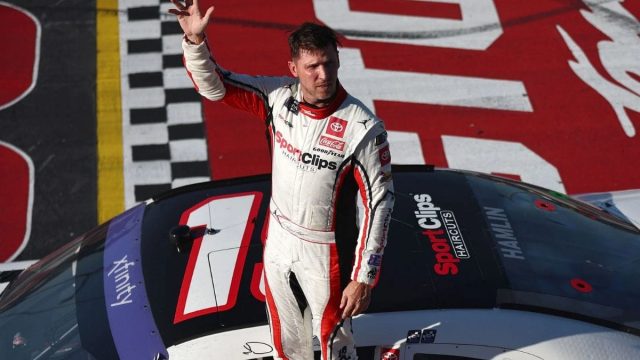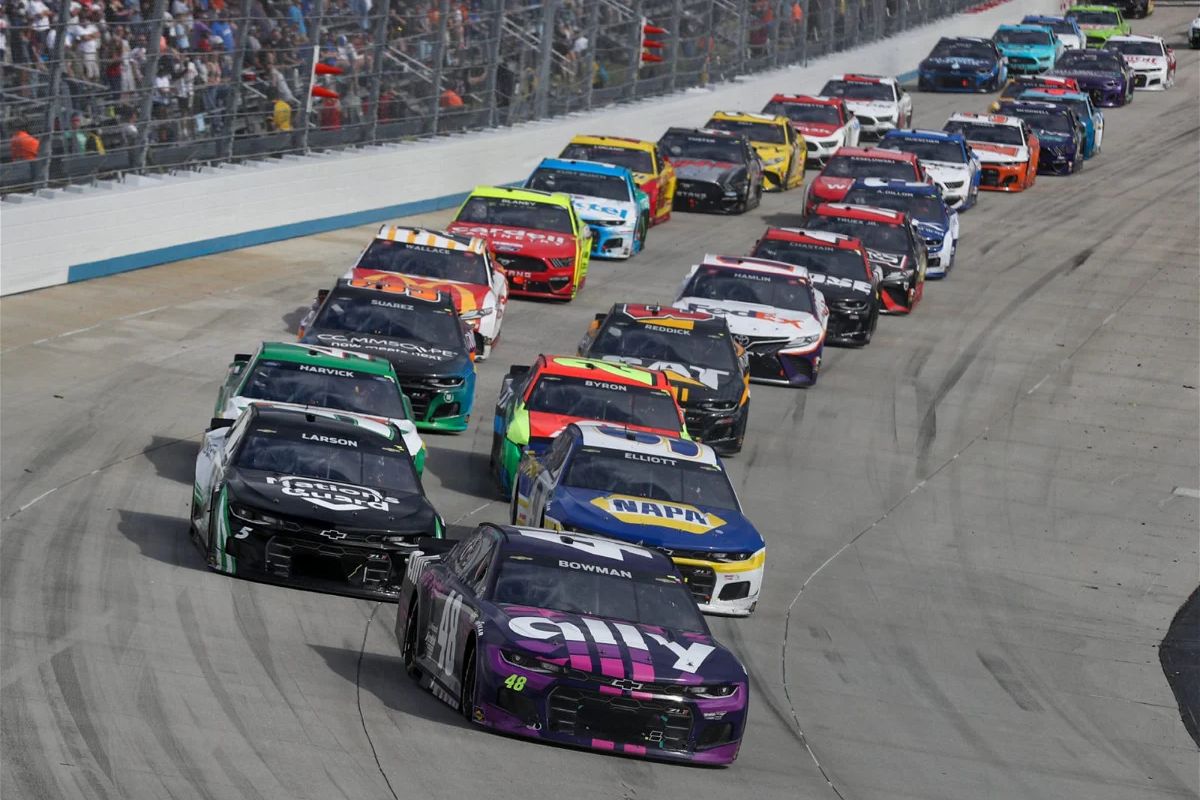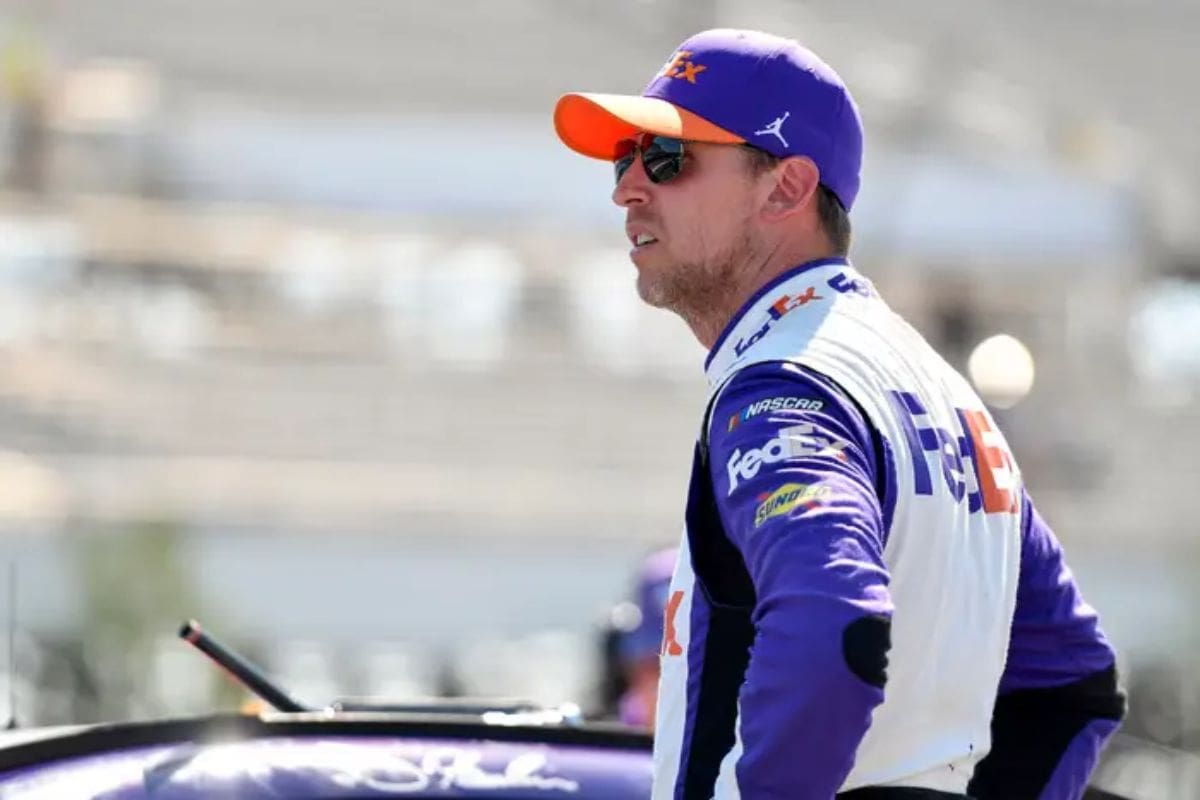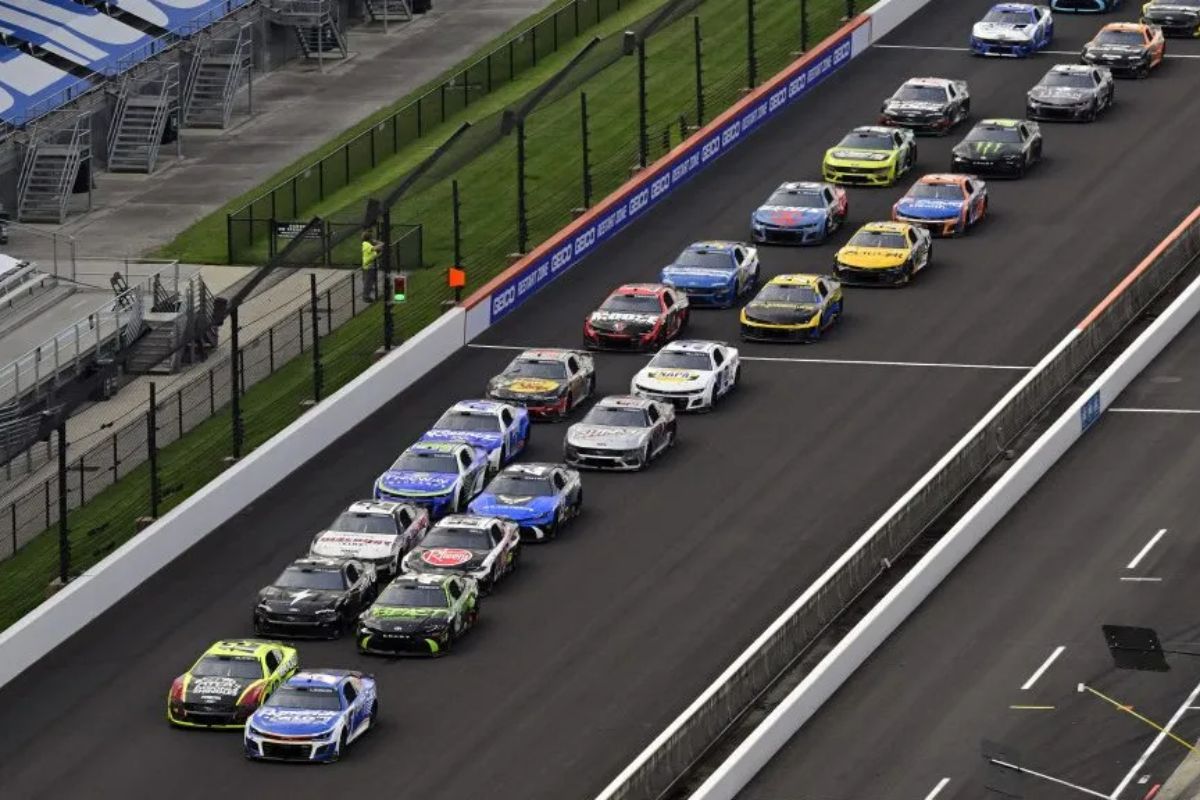Former Xfinity Star’s Comments on Denny Hamlin: Landon Cassill’s recent remarks regarding Denny Hamlin‘s call for financial reforms in the NASCAR Cup Series have ignited a critical dialogue among insiders, particularly concerning the intricate dynamics of team expenditures. Cassill’s assertion that teams should prioritize better financial management over dependency on potential revenue-sharing changes highlights a deeper unease about the sport’s financial structure. This raises pertinent questions about the balance between fiscal responsibility and the need for systemic reform in an evolving racing landscape. As the conversation unfolds, the implications of these differing perspectives could reshape the future of the sport.
Key Highlights
- Former Xfinity star Landon Cassill criticized Denny Hamlin’s revenue sharing demands, suggesting teams need to manage spending more effectively.
- Cassill’s comments reflect a broader tension between calls for financial reform and the need for responsible budgeting in NASCAR.
- Hamlin’s push for equitable revenue sharing aims to address financial disparities impacting smaller teams’ sustainability and competitive viability.
- The debate highlights systemic issues within NASCAR, emphasizing the pressure on teams to balance operational costs with revenue generation.
Financial Strain in NASCAR
The escalating financial strain in NASCAR has become an urgent concern for teams, as ongoing delays in charter negotiations and limited revenue sharing threaten their sustainability and competitive viability.
The intricate financial ecosystem of NASCAR is predicated on substantial investments in technology, personnel, and infrastructure. Unlike traditional sports, where athletic skill often dictates success, NASCAR teams invest heavily in high-performance vehicles and specialized teams of engineers and mechanics. This unique dependency amplifies the financial burdens they face.
The current stagnation in charter negotiations exacerbates these challenges. Charters serve as a safety net, providing teams with a guaranteed share of the revenue. However, the delay in reaching new agreements leaves many teams in a precarious position, unable to forecast their financial future accurately. Consequently, operating budgets become strained, forcing teams to make difficult decisions regarding staffing, equipment, and ultimately, their competitiveness on the track.
Moreover, the limited revenue sharing model further compounds the issue. While larger teams may have lucrative sponsorship deals and profitable merchandise sales, smaller teams often struggle to secure adequate funding. This imbalance creates a competitive disparity that undermines the integrity of the sport and diminishes fan engagement.
The financial turmoil therefore not only threatens the viability of individual teams but also raises concerns about the general health of NASCAR as a premier motorsport.
Denny Hamlin’s Protest and Cassill’s Response
Amidst the ongoing financial challenges faced by NASCAR teams, Denny Hamlin has emerged as a vocal critic of the sport’s governance, advocating for substantial reforms to address the economic disparities affecting team operations. His recent calls for increased revenue sharing, permanent charters, a seat at the decision-making table, and a share of income from new business ventures encapsulate the pressing issues confronting the NASCAR ecosystem.
However, Hamlin’s protests have not gone unchallenged. Landon Cassill, a former Xfinity driver, has publicly critiqued these demands, suggesting that they may be overstated. During his appearance on The Money Lap podcast, Cassill contended that teams could exercise greater discretion in their spending, stating emphatically, “NASCAR is not making you hire 100 engineers. NASCAR is not making you rent private jets. NASCAR is not making you spend $250k on a pit box.” This perspective raises a critical dialogue about financial responsibility and accountability within the sport.
NASCAR can very easily take this position of “we’re not making you spend $18 million”#NASCAR pic.twitter.com/54rtBdjnon
— The Money Lap (@themoneylap) July 23, 2024
Cassill’s remarks reflect a broader tension in NASCAR, where perceptions of financial mismanagement can complicate the narrative surrounding legitimate grievances. While Hamlin’s advocacy stems from a sincere concern for the sustainability of teams, Cassill’s counterpoint highlights the need for teams to assess their operational choices critically.
Denny Hamlin’s Rebuttal
Responding decisively to Landon Cassill’s critique, Denny Hamlin provided a detailed financial analysis that highlights the substantial costs of maintaining competitiveness in NASCAR. He emphasized the necessity of investing heavily in engineering talent, citing a need for approximately eight engineers, which underscores the specialized complexity of the sport.
Hamlin noted that the hard costs of operation can soar to $13 million, with an extra $5 million required to remain competitive. This glaring financial reality serves as a critical counterpoint to Cassill’s assertions, positioning Hamlin as a voice of reason amidst the ongoing debate.
“About 8 engineers. No private Jet. 13m hard cost. 5m to be competitive.”
“We could cut some aesthetic cost however have you seen 3/4 of xfinity garage? Amazing experience that would be for our sponsors.” – Hamlin
Hamlin’s remarks were further reinforced by endorsements from other NASCAR luminaries. Remarkably, spotter Brett Griffin articulated the systemic issues at play, indicating that prioritizing monetary returns over talent could have dire consequences for the sport’s future. His statement that the Xfinity Series is being compromised reflects a broader concern that could ultimately extend to the Cup Series as well.
“Borderline ignorance. Money over talent until we pay the teams to hire talent. The Xfinity Series is slowly being ruined and, in time, Cup will be next. Anyone who doesn’t see the progression and where it’s headed is BLIND.” – Griffin
Likewise, Brian Murphy’s commentary highlighted the dangers of adopting a mindset that sacrifices NASCAR’s prestige for dubious economic justifications.
“This mindset is toxic and unhealthy. NASCAR is 𝘵𝘩𝘦 highest form of motorsport in the western hemisphere. Are we ready to downgrade and give up it’s prestige for fake economical reasons?” – Brian
Collectively, these voices emphasize a consensus that maintaining the integrity and competitiveness of NASCAR requires a reevaluation of its financial structures. As the sport navigates these challenges, Hamlin’s rebuttal serves as a clarion call for stakeholders to prioritize investment in talent and resources, ensuring that NASCAR retains its status as a premier motorsport in the western hemisphere.
Costs and Revenue Discrepancies
Analyzing the financial landscape of NASCAR reveals substantial discrepancies between the costs incurred by teams and the revenue they receive, highlighting a growing imbalance that threatens the sustainability of the sport.
The establishment of 23XI Racing by Denny Hamlin and Michael Jordan emphasizes these financial challenges. Despite entering the competitive arena with limited initial capital, the operational expenses for a single Cup Series car can soar to $18 million before driver salaries are factored in. This substantial cost burden is exacerbated by the need for infrastructure investments, which can demand tens of millions more.
“First, 18M is just for the car on the track to put on this show each and every week. Seems as though you think it’s excessive. Well, we opened our books to NASCAR to show what exactly that money was spent on and that it was not excessive. You mentioned that anything we make beyond 18m is ‘profit.’ That would be incorrect.” – Hamlin
While NASCAR recently secured a lucrative $7.7 billion media rights deal, the distribution of these revenues has not been favorable for the teams. The current allocation allows teams to claim a mere 30 percent of the broadcast revenue, leaving the majority of the financial benefits to the sanctioning body and its associated stakeholders. This inequitable division raises critical questions about the long-term viability of team operations, particularly for those with limited financial backing.
The growing disparity between escalating costs and stagnant or insufficient revenue streams raises alarms among stakeholders, as it jeopardizes competitive balance and team sustainability. If left unaddressed, this imbalance could lead to a contraction of teams, diminish the sport’s appeal, and ultimately erode the foundation upon which NASCAR has built its success.
Expanding on Costs
The intricate financial ecosystem of NASCAR race teams reveals that operational costs extend far beyond the basic expenses of fielding a car. This includes critical functions such as marketing, sponsorship management, and business operations that are fundamental for sustaining competitiveness and promoting the sport’s growth. Denny Hamlin’s insights reflect the multifaceted nature of these expenditures, emphasizing that the $18 million baseline merely represents the entry point for participation.
As Hamlin articulated, the reality of running a team encompasses a myriad of necessary departments, each contributing to the comprehensive operational framework. The investment in business strategies, marketing initiatives, and social media engagement is not an optional luxury; rather, it is a requisite foundation for both team viability and the broader promotion of NASCAR. These costs, often overlooked, are pivotal for attracting sponsors and maintaining fan engagement, thereby ensuring the sport’s relevance in a competitive entertainment landscape.
“As someone who started a team from scratch and kept it as lean as I could, there are MANY other depts at a race team that are 100% necessary to operate. Business, marketing, sponsorship, social media, it goes on and on. That all cost a significant amount of money that is above and beyond the numbers listed above. That money is spent as not only as a necessity for our team but to GROW the sport thru on and off-the-track activation.” – Hamlin
Moreover, the financial intricacies are compounded by the need for continuous innovation and improvement within the sport. Teams must allocate resources not only to maintain current performance levels but also to investigate advancements in technology and safety measures—an investment that transcends traditional operational boundaries.
The argument presented by Hamlin resonates with the broader NASCAR community. Without a favorable resolution between NASCAR officials and race teams regarding financial structures, the ongoing discourse surrounding costs will likely persist, necessitating a reevaluation of the economic model that underpins the sport.
News in Brief: Former Xfinity Star’s Comments on Denny Hamlin
The discourse surrounding financial management in NASCAR highlights a critical junction between individual team accountability and the necessity for broader systemic reforms.
While Denny Hamlin’s call for improved revenue sharing reflects pressing concerns about the sustainability of the sport, Landon Cassill’s emphasis on prudent spending management highlights an alternative perspective.
The ongoing dialogue among insiders demonstrates the complex dynamics at play, suggesting that a multifaceted approach may be crucial for addressing the financial challenges facing the Cup Series.
ALSO READ: Denny Hamlin’s Brickyard 400 Victory Hopes Dashed After the Multi-car Wreck



